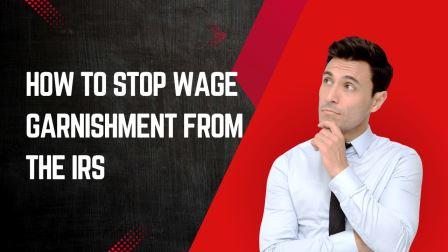Understanding how to stop wage garnishment from the IRS is critical for taxpayers facing financial difficulties. This guide will help you understand the reasons behind IRS wage garnishment, the legal process, and various strategies to prevent or resolve garnishment effectively. By the end, you will be equipped with the knowledge needed to tackle wage garnishment head-on and regain financial stability.
Understanding IRS Wage Garnishment
To stop wage garnishment from the IRS, it’s essential to grasp what it is and why it happens. Wage garnishment occurs when the IRS directs your employer to withhold a portion of your paycheck to recover unpaid tax debts. Unlike other creditors, the IRS does not require a court order to initiate garnishment.
Reasons for Wage Garnishment
Common triggers for IRS wage garnishment include:
- Unpaid Taxes: Failure to pay income, payroll, or other tax liabilities.
- Ignored Notices: Repeatedly disregarding IRS notices and payment demands.
- Ineligibility for Payment Plans: Failure to qualify for installment agreements or other relief options.
The IRS typically uses garnishment as a last resort after exhausting other collection efforts, making it crucial to respond promptly to their communications.
The Wage Garnishment Process
Stopping wage garnishment requires understanding its process:
- Notices from the IRS: Before garnishment, the IRS issues several notices, including:
- CP14: Initial notice of balance due.
- CP504: Final Notice of Intent to Levy.
- 668-W: Notice of Levy sent to your employer.
- Employer Notification: Upon receiving the levy notice, your employer must withhold a specific portion of your wages.
- Garnishment Limits: Federal law ensures that a portion of your income is protected for essential living expenses. The exempt amount depends on your filing status and number of dependents.
Strategies to Stop Wage Garnishment
To stop wage garnishment from the IRS, consider the following options:
1. Pay the Tax Debt in Full
The simplest way to end garnishment is to pay off your tax liability. Once paid, the IRS will release the levy. If immediate payment is not feasible, explore alternative strategies.
2. Negotiate an Installment Agreement
Set up a payment plan to pay your tax debt in manageable monthly installments. Once an agreement is approved and payments begin, garnishment will stop.
3. Submit an Offer in Compromise (OIC)
An OIC allows you to settle your tax debt for less than the full amount owed. To qualify, you must prove financial hardship or inability to pay the full debt.
4. Request Currently Not Collectible (CNC) Status
If paying any amount would cause severe financial hardship, you can request CNC status. The IRS will pause all collection activities, including garnishment, while under CNC status.
5. File for Bankruptcy
Bankruptcy provides temporary relief from garnishment through an automatic stay. However, not all tax debts are dischargeable, so consult a bankruptcy attorney before pursuing this option.
6. Seek Professional Assistance
Consulting a tax professional can provide valuable guidance. A tax attorney or enrolled agent can help you explore the best options based on your situation and negotiate with the IRS on your behalf.
Case Study: Overcoming IRS Wage Garnishment
Scenario: Mary, a small business owner, fell behind on her taxes after unexpected medical expenses. She received a Notice of Levy and faced wage garnishment.
Solution:
- Mary consulted a tax attorney who reviewed her financial situation.
- They negotiated an installment agreement with the IRS, stopping the garnishment.
- With the attorney’s help, Mary also enrolled in the IRS Fresh Start Initiative, reducing her penalties and interest.
This case highlights the importance of seeking professional help to resolve tax issues efficiently.
Let’s Summarize…
Stopping IRS wage garnishment requires a proactive approach. By understanding the process, responding promptly to notices, and exploring options such as payment plans, Offers in Compromise, or CNC status, you can protect your income and resolve your tax debt. Seeking professional assistance can further simplify the process and improve your chances of success.
FAQs
How does a credit card garnish your wages?
A credit card company must sue you, obtain a court judgment, and then initiate garnishment through your employer.
How much can a credit company garnish your wages?
Federal law allows garnishment of up to 25% of disposable earnings or the amount exceeding 30 times the federal minimum wage, whichever is less.
What states do not allow wage garnishment for credit card debt?
States like Texas and North Carolina restrict wage garnishment for consumer debts, including credit cards.
Can a debt collector garnish your wages without you knowing?
No, you must receive a notification and court order before wage garnishment begins.
